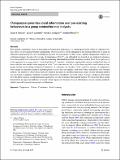Files in this item
Chimpanzees prioritise social information over pre-existing behaviours in a group context but not in dyads
Item metadata
| dc.contributor.author | Watson, Stuart | |
| dc.contributor.author | Lambeth, Susan P. | |
| dc.contributor.author | Schapiro, Steven J. | |
| dc.contributor.author | Whiten, Andrew | |
| dc.date.accessioned | 2018-03-27T12:30:06Z | |
| dc.date.available | 2018-03-27T12:30:06Z | |
| dc.date.issued | 2018-03-24 | |
| dc.identifier | 252588279 | |
| dc.identifier | 3485d8f3-c51c-41fd-a29f-32d17bad48fe | |
| dc.identifier | 85044342910 | |
| dc.identifier | 000430491500008 | |
| dc.identifier.citation | Watson , S , Lambeth , S P , Schapiro , S J & Whiten , A 2018 , ' Chimpanzees prioritise social information over pre-existing behaviours in a group context but not in dyads ' , Animal Cognition , vol. First Online . https://doi.org/10.1007/s10071-018-1178-y | en |
| dc.identifier.issn | 1435-9448 | |
| dc.identifier.other | ORCID: /0000-0003-2426-5890/work/65014029 | |
| dc.identifier.uri | https://hdl.handle.net/10023/13029 | |
| dc.description | Funding: John Templeton Foundation (US) (40128). | en |
| dc.description.abstract | How animal communities arrive at homogeneous behavioural preferences is a central question for studies of cultural evolution. Here, we investigated whether chimpanzees (Pan troglodytes) would relinquish a pre-existing behaviour to adopt an alternative demonstrated by an overwhelming majority of group mates; in other words, whether chimpanzees behave in a conformist manner. In each of five groups of chimpanzees (N = 37), one individual was trained on one method of opening a two-action puzzle box to obtain food, while the remaining individuals learned the alternative method. Over 5 h of open access to the apparatus in a group context, it was found that 4/5 ‘minority’ individuals explored the majority method and three of these used this new method in the majority of trials. Those that switched did so after observing only a small subset of their group, thereby not matching conventional definitions of conformity. In a further ‘Dyad’ condition, six pairs of chimpanzees were trained on alternative methods and then given access to the task together. Only one of these individuals ever switched method. The number of observations that individuals in the minority and Dyad individuals made of their untrained method was not found to influence whether or not they themselves switched to use it. In a final ‘Asocial’ condition, individuals (N = 10) did not receive social information and did not deviate from their first-learned method. We argue that these results demonstrate an important influence of social context upon prioritisation of social information over pre-existing methods, which can result in group homogeneity of behaviour. | |
| dc.format.extent | 12 | |
| dc.format.extent | 950743 | |
| dc.language.iso | eng | |
| dc.relation.ispartof | Animal Cognition | en |
| dc.subject | Chimpanzee | en |
| dc.subject | Culture | en |
| dc.subject | Conformity | en |
| dc.subject | Social learning | en |
| dc.subject | H Social Sciences | en |
| dc.subject | QH301 Biology | en |
| dc.subject | QL Zoology | en |
| dc.subject | NDAS | en |
| dc.subject.lcc | H | en |
| dc.subject.lcc | QH301 | en |
| dc.subject.lcc | QL | en |
| dc.title | Chimpanzees prioritise social information over pre-existing behaviours in a group context but not in dyads | en |
| dc.type | Journal article | en |
| dc.contributor.sponsor | John Templeton Foundation | en |
| dc.contributor.institution | University of St Andrews. School of Psychology and Neuroscience | en |
| dc.identifier.doi | 10.1007/s10071-018-1178-y | |
| dc.description.status | Peer reviewed | en |
| dc.identifier.grantnumber | 40128 | en |
This item appears in the following Collection(s)
Items in the St Andrews Research Repository are protected by copyright, with all rights reserved, unless otherwise indicated.

